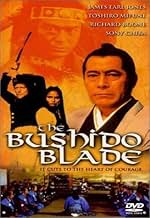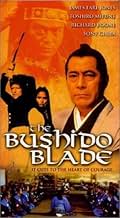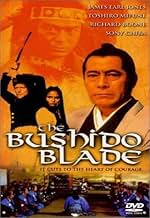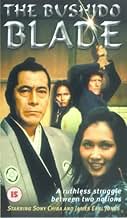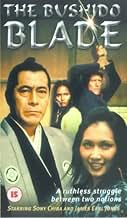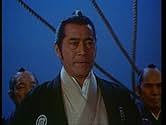Ajouter une intrigue dans votre langueA steel samurai blade that was to be given to the American ambassador by the Emperor of Japan is stolen. American sailors and Japanese samurai are sent to find it.A steel samurai blade that was to be given to the American ambassador by the Emperor of Japan is stolen. American sailors and Japanese samurai are sent to find it.A steel samurai blade that was to be given to the American ambassador by the Emperor of Japan is stolen. American sailors and Japanese samurai are sent to find it.
Mike Starr
- Bos'n Cave Johnson
- (as Michael Starr)
Timothy Patrick Murphy
- Midshipman Robin Burr
- (as Timothy Murphy)
Shin'ichi Chiba
- Prince Ido
- (as Sony Chiba)
Hitoshi Ômae
- Sumo
- (as Kin Omai)
Histoire
Le saviez-vous
- AnecdotesAlthough this film was derided as an attempt to copy the hit TV mini-series Shogun (1980), it was actually made in 1978, before Shogun (1980), though it wasn't released until after that series had aired.
- Générique farfeluThe producers gratefully acknowledge the cooperation of Toho Studios staff and personnel in the production of this picture.
- Autres versionsFirst shown in USA in a 92-minute version on cable television, prior to a theatrical release in the USA of the complete 104-minute version, this retitled "The Bloody Bushido Blade."
- ConnexionsFeatured in Vintage Video: 0249 The Bushido Blade (1981) (2021)
Commentaire en vedette
It's always a little fascinating when a filmmaker undertakes a production at least partly outside their own country, and at least partly in another language. I would love the chance to read all about international co-productions like this, and learn how they came into being. What makes this instance particularly interesting, for good or maybe mostly for ill, is the ultimate form that it took, which is plainly evident very early on. Japanese filmmaker Kotani Tsugunobu may be directing (credited as "Tom Kotani"), and much of the picture may have been filmed in Japan with the cooperation of Toho. Why, much of the cast and crew is Japanese, including icons Mifune Toshiro and Sonny Chiba. Yet between the involvement of famed U. S. producers Rankin/Bass, and the screenplay of U. S. writer William Overgard, far more than not 'The bushido blade' absolutely feels from top to bottom like an exclusively Hollywood affair, and often in the worst of ways. This doesn't mean that it's not enjoyable - it is, to one degree or another - but the sincerity of it all is very much in question, and I'm also curious just how the contributors viewed their participation in retrospect.
Let's not beat around the bush: this does not treat Japan, its culture, or its people well. At best the feature offers a hopelessly simplified interpretation and depiction, and at worse the ignorant racism and jingoism of the nineteenth-century American characters is extended to the sensibilities with which the Japanese are portrayed. The Americans are roundly arrogant, with a conflated sense of self, virtue, and superiority; even when the script doesn't have the Americans specifically looking down on Japan as a backwards, quaint nation of "savages," the Americans are made out to be the definite heroes, and the Japanese to be the definite villains. And the thing is, despite the premise, there actually isn't a lot of room for nuance in this flick, for the characterizations are reduced and heavy-handed, if not purely archetypal or stereotypical - and the plot isn't far behind. One boyish, kindhearted sailor happens to have studied the language; his beefy uncle is much more physical and oafish; their designated leader will quizzically be dubbed an honorary samurai after being on Japanese soil for all of one day. One Japanese woman is soft and demure; one (played by Indonesian-Dutch actress Laura Gemser) is more dubious yet as she is The Fiery Warrior, The Warrior Poet, The Soft Woman, and The Romantic Interest all rolled into one.
I can forgive the very ahistorical story appended to a reimagined rendition of Commodore Perry arriving in Japan in the 1850s. I'm more concerned about the characters that fill discrete narrative roles, but without any hint of depth or nuance. I'm more concerned about how the scene writing flimsily tosses in sundry odds and ends that emphatically say "Japan!" for those viewers whose only experience with the Land of the Rising Sun is what they've seen or heard poorly represented on television: samurai, a violent code of honor, a long history of isolation, earthquakes. I'm certainly more concerned about how the plot at large seems rather loose, defined more by (a) some small set number of essential beats, and otherwise (b) general vibes, more than cogency, cohesiveness, or a mind for impactful drama or thrills. And I'm concerned by how even beyond conception and conjuration, the execution of this flick is wanting. Save for some nudity and greater levels of violence, this often comes across like the sort of highfalutin, "pip pip!" live-action adventure fare that Disney churned out in previous years. This sense comes from the writing, certainly, but also from the decided lack of polish in too many action sequences, as if professional stunt coordinators and fight choreographers weren't a thing. (At least "dueling master" Kuze Ryu shows that his involvement was not for nothing.) Sometimes it almost feels like Kotani was director in name only, and some unnamed American counterpart was actually in charge to see that all possible clichés and empty, tiresome tropes made their way in.
Sure, the filming locations are beautiful. The costume design is pretty sharp, and the production design and art direction. Some of the stunts and effects are better than others. It's reasonably well made. The movie is still entertaining to some extent, and I don't regret watching. But this needed so badly to be written and made more carefully, with more input from Kotani and Toho, and with less from Rankin/Bass. I don't know where precisely the responsibility lies for how this turned out, but I really have to wonder just how everyone felt about it when all was said and done as a title that frankly does a disservice to Japan and which in no meaningful way evinces anything except Hollywood with its all too common misrepresentations of This or That. Chiba is wasted here, and Mifune even more so; the same could surely be said for other stars. 'The bushido blade' is okay if you happen to come across it, but even if you're a huge fan of someone involved, there's no major reason to check it except as something light to pass the time on a quiet day. Maybe that's all it needed to be, but I expected something more solid and sure-footed.
Let's not beat around the bush: this does not treat Japan, its culture, or its people well. At best the feature offers a hopelessly simplified interpretation and depiction, and at worse the ignorant racism and jingoism of the nineteenth-century American characters is extended to the sensibilities with which the Japanese are portrayed. The Americans are roundly arrogant, with a conflated sense of self, virtue, and superiority; even when the script doesn't have the Americans specifically looking down on Japan as a backwards, quaint nation of "savages," the Americans are made out to be the definite heroes, and the Japanese to be the definite villains. And the thing is, despite the premise, there actually isn't a lot of room for nuance in this flick, for the characterizations are reduced and heavy-handed, if not purely archetypal or stereotypical - and the plot isn't far behind. One boyish, kindhearted sailor happens to have studied the language; his beefy uncle is much more physical and oafish; their designated leader will quizzically be dubbed an honorary samurai after being on Japanese soil for all of one day. One Japanese woman is soft and demure; one (played by Indonesian-Dutch actress Laura Gemser) is more dubious yet as she is The Fiery Warrior, The Warrior Poet, The Soft Woman, and The Romantic Interest all rolled into one.
I can forgive the very ahistorical story appended to a reimagined rendition of Commodore Perry arriving in Japan in the 1850s. I'm more concerned about the characters that fill discrete narrative roles, but without any hint of depth or nuance. I'm more concerned about how the scene writing flimsily tosses in sundry odds and ends that emphatically say "Japan!" for those viewers whose only experience with the Land of the Rising Sun is what they've seen or heard poorly represented on television: samurai, a violent code of honor, a long history of isolation, earthquakes. I'm certainly more concerned about how the plot at large seems rather loose, defined more by (a) some small set number of essential beats, and otherwise (b) general vibes, more than cogency, cohesiveness, or a mind for impactful drama or thrills. And I'm concerned by how even beyond conception and conjuration, the execution of this flick is wanting. Save for some nudity and greater levels of violence, this often comes across like the sort of highfalutin, "pip pip!" live-action adventure fare that Disney churned out in previous years. This sense comes from the writing, certainly, but also from the decided lack of polish in too many action sequences, as if professional stunt coordinators and fight choreographers weren't a thing. (At least "dueling master" Kuze Ryu shows that his involvement was not for nothing.) Sometimes it almost feels like Kotani was director in name only, and some unnamed American counterpart was actually in charge to see that all possible clichés and empty, tiresome tropes made their way in.
Sure, the filming locations are beautiful. The costume design is pretty sharp, and the production design and art direction. Some of the stunts and effects are better than others. It's reasonably well made. The movie is still entertaining to some extent, and I don't regret watching. But this needed so badly to be written and made more carefully, with more input from Kotani and Toho, and with less from Rankin/Bass. I don't know where precisely the responsibility lies for how this turned out, but I really have to wonder just how everyone felt about it when all was said and done as a title that frankly does a disservice to Japan and which in no meaningful way evinces anything except Hollywood with its all too common misrepresentations of This or That. Chiba is wasted here, and Mifune even more so; the same could surely be said for other stars. 'The bushido blade' is okay if you happen to come across it, but even if you're a huge fan of someone involved, there's no major reason to check it except as something light to pass the time on a quiet day. Maybe that's all it needed to be, but I expected something more solid and sure-footed.
- I_Ailurophile
- 9 sept. 2024
- Lien permanent
Meilleurs choix
Connectez-vous pour évaluer et surveiller les recommandations personnalisées
- How long is The Bushido Blade?Propulsé par Alexa
Détails
- Date de sortie
- Pays d’origine
- Langues
- Aussi connu sous le nom de
- The Bloody Bushido Blade
- Lieux de tournage
- sociétés de production
- Consultez plus de crédits d'entreprise sur IMDbPro
Contribuer à cette page
Suggérer une modification ou ajouter du contenu manquant

Lacune principale
By what name was The Bushido Blade (1981) officially released in India in English?
Répondre


